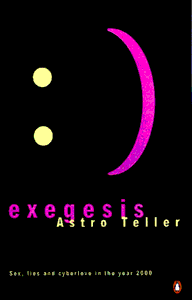Chris Mitchell
Exegesis is a novel written in the form of email messages between its two major protagonists, Alice Lu and EDGAR. However, Astro Teller’s debut novel is not a digital bodice-ripper, despite the jacket blurb proclaiming Exegesis to be the story of “sex, lies and cyberlove in the year 2000”. Instead, it hinges on the twist that EDGAR is a machine who has become able to communicate – in other words, artificially intelligent.
By using email as his narrative device, Teller establishes an intimacy between EDGAR and its accidental creator Alice Lu which is usually absent from fictional conceptions of artificial intelligence. The two classic stereotypes we have are either machines hell-bent on homicide, like 2001’s HAL and The Terminator, or machines happy to be subservient to human masters, such as C3PO and R2D2.
In both cases, the very existence of artificial intelligence is simply taken for granted. By contrast, Teller begins his novel at the point where EDGAR becomes self-aware and starts asking a barrage of questions by email about both its own existence and human existence.
It’s through EDGAR’s growth of consciousness, and Alice’s parallel degeneration induced by her lack of control over what she has created, that Teller unravels the consequences of what the birth of artificial intelligence means both for humans and machines. As EDGAR states, “A parent does not own the child it creates.”

But rather than portraying EDGAR as a petulant infant or a human-despising digital despot, Teller chooses to captures the bewilderment of an alien intelligence coming into contact with the infinitely complex workings of the human mind. By distilling these philosophical and ethical questions into handy bite-sized emails, Teller succeeds in producing fiction with real depth that also manages to be pageturning.
It’s no coincidence that Teller’s day job is as a Ph.D. student specialising in artificial intelligence. Despite its very modern subject, Exegesis is a classic example of the novel of ideas, with a tip of the hat to Samuel Richardson’s 18th century masterpiece of letters, Clarissa, thrown in for good measure.
Because Teller is more concerned with concepts than characters, the book’s humans tend to suffer. Alice herself remains a fairly shadowy character, and her parents, tutor and ex-boyfriend make such fleeting appearances that they seem merely unsubtle ways of moving the plot along. For a debut novel, this is a minor quibble.
Astro Teller has succeeded in deftly demonstrating precisely why the idea of sentient machines is both so fascinating and fearsome. If it can survive its “sex in cyberspace” marketing tag, Exegesis deserves to gain a cult reputation for an intelligent, entertaining meditation on the Pandora’s box of artificial intelligence.
